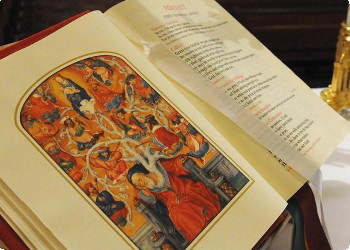RECEIVE THE HOLY SPIRIT
At 4,32-35; Ps 117; 1Jn 5,1-6; Jn 20,19-31
8 APRIL – II SUNDAY OF EASTER – B
In the Garden of Eden man was created by God so that he always lived, without detaching himself for a moment, from him and his will, made known to him as a given word. Nothing from the heart of man, instead everything must be from the heart of God.
The Lord God formed man out of the clay of the ground and blew into his nostrils the breath of life, and so man became a living being. The Lord God then took the man and settled him in the garden of Eden, to cultivate and care for it. The Lord God gave man this order: “You are free to eat from any of the trees of the garden except the tree of knowledge of good and bad. From that tree you shall not eat; the moment you eat from it you are surely doomed to die” (Gen 2,7.15-17).
The Upper Room is the new Garden of Eden. Jesus takes the clay of sin and death of his apostles and blows the Holy Spirit upon them. Giving them a precise command: “To those whose sins you forgive, they will be forgiven; to those whom you will not forgive, they will not be forgiven”. As Adam must always live, without any interruption or disconnection from the will of the Father, from his explicit command, so also the apostles will have to live from the command of Christ for all the days of their life. They are “ordained” to the forgiveness of sins. It is a very delicate and complex mission. Like Jesus, first they must teach men what is falsehood and what is truth, what is right and what is unjust, what is good and what is bad, what the will of God is and what is not his will. The same commandment received from Christ from the Father applies to them. He is the Lamb of God that takes away the sin of the world. But how does he remove it? First he reveals it, teaches it, by giving the pure will of the Father. Then he shows how the will of the Father is entirely lived, without neglecting even a dash of it, finally he climbs on the cross and lets himself be burnt and victimized for the expiation of every sin. If the disciples do not walk the way of Christ, no sin will be recognized by man and their missionary work is vain, useless and even harmful. There is neither salvation nor redemption.
On the evening of that first day of the week, when the doors were locked, where the disciples were, for fear of the Jews, Jesus came and stood in their midst and said to them, “Peace be with you.” When he had said this, he showed them his hands and his side. The disciples rejoiced when they saw the Lord. (Jesus) said to them again, “Peace be with you. As the Father has sent me, so I send you.” And when he had said this, he breathed on them and said to them, “Receive the holy Spirit. Whose sins you forgive are forgiven them, and whose sins you retain are retained.” Thomas, called Didymus, one of the Twelve, was not with them when Jesus came. So the other disciples said to him, “We have seen the Lord.” But he said to them, “Unless I see the mark of the nails in his hands and put my finger into the nail marks and put my hand into his side, I will not believe.” Now a week later his disciples were again inside and Thomas was with them. Jesus came, although the doors were locked, and stood in their midst and said, “Peace be with you.” Then he said to Thomas, “Put your finger here and see my hands, and bring your hand and put it into my side, and do not be unbelieving, but believe.” Thomas answered and said to him, “My Lord and my God!” Jesus said to him, “Have you come to believe because you have seen me? Blessed are those who have not seen and have believed.” Now Jesus did many other signs in the presence of (his) disciples that are not written in this book. But these are written that you may (come to) believe that Jesus is the Messiah, the Son of God, and that through this belief you may have life in his name.
The forgiveness of sins does not consist in a “sterile sacramental absolution”. Without formation, enlightenment and teaching of good and evil, of what is the will of God and of what is not God’s will is not with divine, Holy Spirit precision, the whole celebration of the sacraments is exposed to nothingness if not to sacrilege. We can say that today this is the failure of so much apostolic ministry. Many human conveniences are taught, but not the divine Law according to the heart of Christ. The Apostle of the Lord is a perennial singer, without ever getting tired, of the will of his Master, just as his Master was the singer of the divine will of the Father. If today even the minister no longer knows what sin is, might he ever forgive it effectively in others?
Virgin Mary, Mother of the Redemption, Angels and Saints make us true imitators of Christ.





